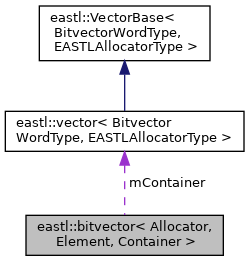#include <bitvector.h>
Collaboration diagram for eastl::bitvector< Allocator, Element, Container >:

Public Types | |
| enum | { kBitCount = 8 * sizeof(Element) } |
| -1 is reserved for 'npos'. It also happens to be slightly beneficial that kMaxSize is a value less than -1, as it helps us deal with potential integer wraparound issues. | |
| typedef bitvector< Allocator, Element > | this_type |
| typedef bool | value_type |
| typedef bitvector_reference< Element > | reference |
| typedef bool | const_reference |
| typedef bitvector_iterator< Element > | iterator |
| typedef bitvector_const_iterator< Element > | const_iterator |
| typedef eastl::reverse_iterator< iterator > | reverse_iterator |
| typedef eastl::reverse_iterator< const_iterator > | const_reverse_iterator |
| typedef Allocator | allocator_type |
| typedef Element | element_type |
| typedef Container | container_type |
| typedef eastl_size_t | size_type |
| typedef ptrdiff_t | difference_type |
Public Member Functions | |
| bitvector (const allocator_type &allocator) | |
| bitvector (size_type n, const allocator_type &allocator=EASTL_BITVECTOR_DEFAULT_ALLOCATOR) | |
| bitvector (size_type n, value_type value, const allocator_type &allocator=EASTL_BITVECTOR_DEFAULT_ALLOCATOR) | |
| bitvector (const bitvector ©) | |
| template<typename InputIterator > | |
| bitvector (InputIterator first, InputIterator last) | |
| bitvector & | operator= (const bitvector &x) |
| void | swap (this_type &x) |
| template<typename InputIterator > | |
| void | assign (InputIterator first, InputIterator last) |
| iterator | begin () EA_NOEXCEPT |
| const_iterator | begin () const EA_NOEXCEPT |
| const_iterator | cbegin () const EA_NOEXCEPT |
| iterator | end () EA_NOEXCEPT |
| const_iterator | end () const EA_NOEXCEPT |
| const_iterator | cend () const EA_NOEXCEPT |
| reverse_iterator | rbegin () EA_NOEXCEPT |
| const_reverse_iterator | rbegin () const EA_NOEXCEPT |
| const_reverse_iterator | crbegin () const EA_NOEXCEPT |
| reverse_iterator | rend () EA_NOEXCEPT |
| const_reverse_iterator | rend () const EA_NOEXCEPT |
| const_reverse_iterator | crend () const EA_NOEXCEPT |
| bool | empty () const EA_NOEXCEPT |
| size_type | size () const EA_NOEXCEPT |
| size_type | capacity () const EA_NOEXCEPT |
| void | resize (size_type n, value_type value) |
| void | resize (size_type n) |
| void | reserve (size_type n) |
| void | set_capacity (size_type n=npos) |
| void | push_back () |
| void | push_back (value_type value) |
| void | pop_back () |
| reference | front () |
| const_reference | front () const |
| reference | back () |
| const_reference | back () const |
| bool | test (size_type n, bool defaultValue) const |
| void | set (size_type n, bool value) |
| reference | at (size_type n) |
| const_reference | at (size_type n) const |
| reference | operator[] (size_type n) |
| const_reference | operator[] (size_type n) const |
| element_type * | data () EA_NOEXCEPT |
| const element_type * | data () const EA_NOEXCEPT |
| iterator | insert (const_iterator position, value_type value) |
| void | insert (const_iterator position, size_type n, value_type value) |
| iterator | erase (const_iterator position) |
| iterator | erase (const_iterator first, const_iterator last) |
| reverse_iterator | erase (const_reverse_iterator position) |
| reverse_iterator | erase (const_reverse_iterator first, const_reverse_iterator last) |
| void | clear () |
| void | reset_lose_memory () |
| container_type & | get_container () |
| const container_type & | get_container () const |
| bool | validate () const |
| int | validate_iterator (const_iterator i) const |
Static Public Attributes | |
| static const size_type | npos = container_type::npos |
| static const size_type | kMaxSize = container_type::kMaxSize |
| 'npos' means non-valid position or simply non-position. | |
Protected Attributes | |
| container_type | mContainer |
| size_type | mFreeBitCount |
Detailed Description
template<typename Allocator = EASTLAllocatorType, typename Element = BitvectorWordType, typename Container = eastl::vector<Element, Allocator>>
class eastl::bitvector< Allocator, Element, Container >
bitvector
Implements an array of bits treated as boolean values. bitvector is similar to vector<bool> but uses bits instead of bytes and allows the user to use other containers such as deque instead of vector. bitvector is different from bitset in that bitset is less flexible but uses less memory and has higher performance.
To consider: Rename the Element template parameter to WordType, for consistency with bitset.
The documentation for this class was generated from the following file:
- third_party/EASTL/include/EASTL/bitvector.h